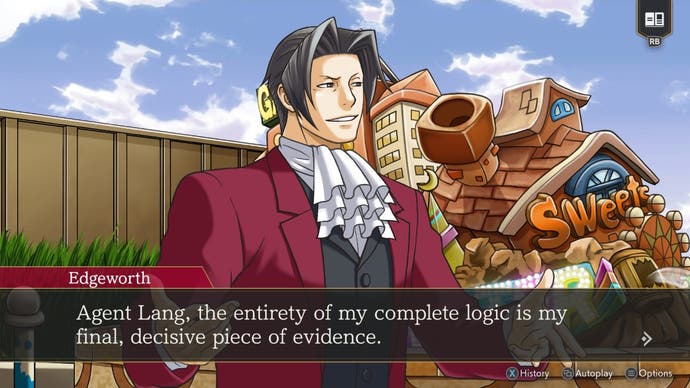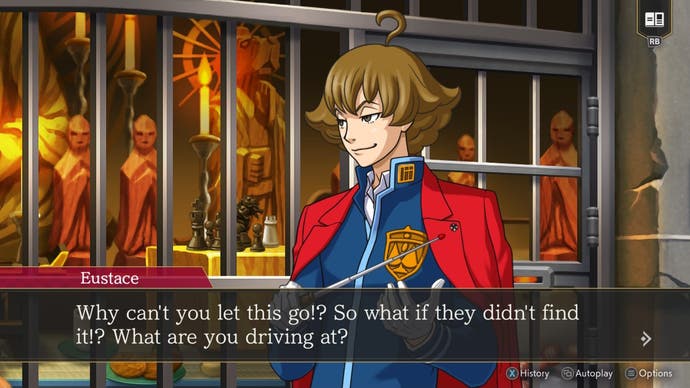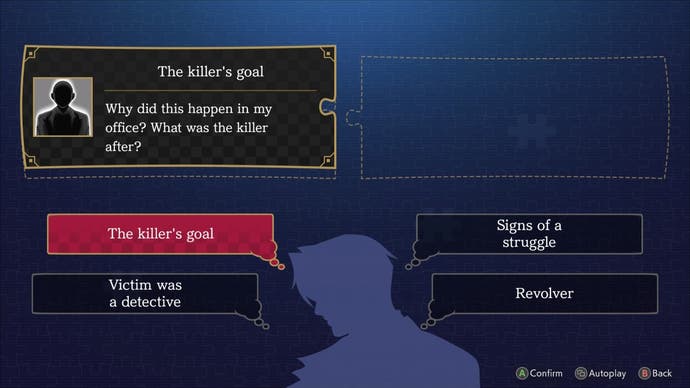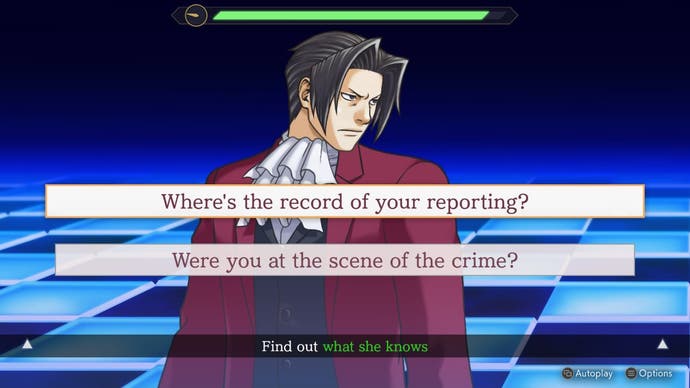One of Capcom’s most handsome Ace Attorney remasters to date, the Investigations Collection brings welcome improvements to some longstanding series weaknesses, but divorcing it from its courtroom setting and structure is its biggest and most fatal flaw.
Ruthless villain, reluctant colleague and eventual friend and confidante, Miles Edgeworth has played many roles in Capcom’s Ace Attorney series over the years, and with the fresh excavation of his Nintendo DS-era Investigations spin-offs, he can also add budding detective and even associate defense lawyer to the list as well. Indeed, it’s a wonder that Phoenix Wright and the rest of the defense profession isn’t surplus to requirements at this point, so watertight are Edgeworth’s various case files here that any potential court trial would be over before it began.
Of course, one of the defining traits of the Investigations games is that there aren’t any court trials, with the action instead shifting solely onto the prosecution’s titular evidence-gathering phase before these cases get brought before a judge. That’s not to say the trials aren’t there in spirit, though, as the main thrust of each case is still all about rooting out the real whodunnits and whys by using that evidence to unpick suspicious testimonies and witness statements in lively bouts of verbal combat . These ‘rebuttal arguments’ are essentially unofficial trials in all but name, and in Investigations 2: Prosecutor’s Gambit, they’re also joined by Sherlockian (or should that be Herlockian?) games of ‘mind chess’ as you try and coax even more information out of particularly stubborn suspects.
By this logic, the fingerprints of the mainline Ace Attorney games are still very much intact here. But in untethering these mysteries from their courtroom origins, the Investigations Collection also exposes itself to some far more critical flaws that become increasingly hard to overlook. Not only do these games contain some of the series’ weakest cases to date – respectively revolving around slightly limp feeling smuggling and corruption capers – but it also turns out that having a proper judge overseeing your arguments does, in fact, lend them a touch more credibility than simply having the criminal themselves decides if you’ve proven them sufficiently guilty or not. And man alive, they’re a slippery bunch, this lot, jumping from one blatant lie to another just to make you dance to the tune of their own satisfaction a little longer.
Even the opposing legal forces you encounter seem unusually asinine here, too, and there’s little joy to be had in repeatedly debunking theories that you know are based on nothing but pure conjecture and assumption. They’re the kinds of arguments that would get instantly thrown out if they were put in front of an actual courtroom, and for a game that repeatedly harps on about the importance of logic and factual evidence, it doesn’t half mind its cast just making stuff up on the spot simply to kill time. Indeed, when the bulk of one investigation spends longer trying to determine if a police detective sat down to have a snack than the actual double murder that’s just taken place in the room next door, there are times when these mysteries feel like they’re furiously treading water as they try and give you something to do.


They can be exasperating in the extreme, but that’s not to say their cases are all bad. An early airline murder, for example, takes you from the plush lounges of first class right down to the cargo hold (with some great passenger banter in tow), while another death and kidnapping at a theme park lets its designers go to town with some devious and tricksy logic puzzles, wiping away any lingering trauma from the turgid circus case in Justice For All (and to a lesser extent, Spirit of Justice’s slightly protracted magic show murder). One even recalls the excellent climax of Dual Destinies, and the central case of Investigations 2 makes an admirable attempt to recapture the brilliant twists of Trials and Tribulations – even if its execution and plotting leaves something to be desired.
But that’s precisely Investigations’ problem. Its best moments regularly feel like you’ve seen them done better elsewhere, and even though each case is allegedly divided into distinct beginning, middle and end sequences, the constant rinse and repeat of investigation-argument-investigation-argument means they also lack the Dramatic climaxes previously provided by the mainline series’ courtroom battles. The one thing that never fails to delight, though, is watching its cast of ne’er-do-wells squirm and scramble under pressure. Even if they’re constantly running circles around you, their animated expressions remain highly entertaining, and with so many argument sections to help tighten the screw here, the moment they finally crack always feels well-earned and hard-won.

The actual process of investigating a crime scene is also much more fully realized than any other Ace Attorney game. Instead of flicking through largely static dioramas in first person, here you’re running around as a mini, chibi-style Edgeworth from a top-down perspective, allowing Capcom’s art team to really flex their murder muscles. There is, admittedly, still some lingering fussiness in only being able to approach points of interest from one of eight compass directions (at least with the Steam Deck’s analogue sticks), but exploration as a whole feels so much smoother when you’ve got a full and complete picture of what you’re working with. Plus, when your assistant Kay arrives on the scene, her ability to conjure full-on virtual reality mock-ups of the crime itself really lets you luxuriate in its fine details.
These larger, more fully-formed environments also allow Edgeworth to indulge in something that Phoenix Wright has never quite managed to put his waggling finger on – actual, honest to goodness deductions that are based on observations and lingering questions about a scene, that don’t t easily fall into the bucket of traditional hard evidence. Rather, Investigations files these thought threads away into a separate menu screen, tasking players with piecing them together at the right moment to move the story forward. Like its evidence rebuttals, you can’t brute force these, as you’ll still incur a penalty for any incorrect guesses (although why the game has you punish yourself like this is anyone’s guess – it’s yet another downside of not having a judge there to call you out on any potential time-wasting).


But putting aside any slight arbitrariness in its presentation, there’s no denying that its deductions do a much better job of building up your understanding of scene than anything Ace Attorney has attempted before. Indeed, Wright’s pre-trial investigations always felt mildly half-arsed, to put it lightly, and you’d regularly approach the bench with only a hazy understanding of the pertinent facts. Here, though, Edgeworth can wield the full power of his legal acumen, allowing for a much more confident progression of events.
Alas, the same cannot be said of the endless ‘mind chess’ games that get introduced in Investigations 2. On paper, they perform a similar function to Ace Attorney’s Psyche-Locks, unlocking crucial information from buttoned up suspects who refuse to talk. In practice, though, they’re not just sequel gimmickry for the sake of sequel gimmickry. They also fly right in the face of everything Ace Attorney stands for, throwing out its trademark precision and tactful application of evidence for what can only be described as ‘pure vibes’.

Heck, even calling it chess is a stretch, as each turn merely consists of picking from one or two dialogue options or ‘biding your time’ to see if they talk themselves into providing you with the right ‘clue’ to move the conversation forward. It’s incredibly vague, and picking the wrong option not only feels overly punitive in the way it takes great chunks out of your constantly ticking down time bar, but you’re also forced to run through the entire sequence from the beginning again, leading to increasingly circular conversations that will have you reaching for the fast forward button. It robs you of the pleasure of deploying those all-important clues, too, thanks to Edgeworth’s constant internal monologue on when to use them.
Fortunately, these maddening mind exercises are used relatively sparingly across the second game, but as I closed in the collection’s protracted finale, I couldn’t help but feel relieved that it was all coming to an end. The Investigations games are certainly an interesting spin on the Ace Attorney formula, and it’s admirable that Capcom has gone to such great lengths to modernize (and in the case of the second game, localize) them in the way it has. But even now, they’re still very much the deep cuts of the Ace Attorney series, their flawed construction and frustrating scenarios putting them very much at the bottom of the pile for me. They certainly shouldn’t be the first Ace Attorney games you play, and newcomers will be much better served by either the original trilogy (if only to understand this pair’s incessant call-backs and cameos to previous characters) or the historically set Great Ace Attorney Chronicles. But the fact these games have been released at all gives me some hope that we might yet see Phoenix Wright rise again one day in the future. Edgeworth may be a handy jack of all trades in these investigations, but there’s one role he can arguably never fill – because when you’re up against the world’s wiliest lying toerags, only the law’s biggest serial bluffer is (w)right for the job .
A copy of Ace Attorney Investigations Collection was provided for review by Capcom.
#Ace #Attorney #Investigations #Collection #review #Capcoms #weakest #legal #mysteries #strongest #glowup